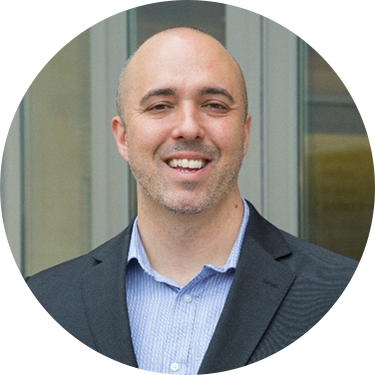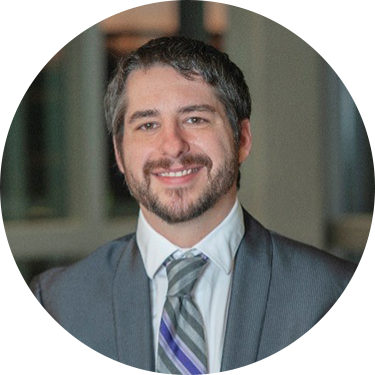OHRP Welcome Address
(10:00 am – 10:05 am EDT)
Session I: Ethical and Theoretical Considerations
Session 1
(10:05 am – 1:00 pm EDT)
Moderator: Neal Dickert, MD, PhD
Associate Professor, Emory University School of Medicine, Division of Cardiology, Emory University Rollins School of Public Health, Department of Epidemiology, Emory Health Services Research Center, Emory Center for Ethics
Read Biography

Neal Dickert is Associate Professor of Medicine in the Division of Cardiology at the Emory University School of Medicine. He holds a secondary appointment in Epidemiology at the Rollins School of Public Health and is a senior faculty fellow at the Emory Center for Ethics. He is Associate Director of the Emory Health Services Research Center and Director of the Georgia Clinical and Translational Science Alliance Recruitment Center. Dr. Dickert is a board-certified cardiologist and PhD-trained ethics researcher.
Dr. Dickert’s research focuses on ethical issues in clinical research and decision-making in clinical cardiology. Specific emphases in research ethics include the conduct of trials in acute care, recruitment and consent for clinical research generally, and the use of incentives and other influences on decision-making. He is an alumnus of the Greenwall Faculty Scholars Program and a past recipient of the Pillars of PRIM&R award. Dr. Dickert is also a member of multiple Data Safety and Monitoring Committees.
Advancing justice, equity, and inclusion through payment for research participation
Routine costs associated with participation in clinical research create barriers for enrollment of economically disadvantaged groups and individuals. Are approaches to payment that leave participants financially worse off from research participation inherently unjust? What are the ethical considerations for using payment to promote justice, equity, and inclusion of historically underrepresented groups in research?
Speaker: Luke Gelinas, PhD
Sr. Chair Director, Advarra
Read Biography

Luke is a Sr. Chair Director at Advarra IRB where he provides analysis and guidance on complex ethical issues arising in the course of clinical research study design and human participant protection. He holds a PhD in Philosophy with a concentration in Ethics from the University of Toronto and an MA in Religion, summa cum laude, from Yale Divinity School.
What do IRBs and investigators think about payment for research participation?
What are the attitudes and practices of IRBs and investigators regarding payment for research participation? Why have investigators and IRBs traditionally been reluctant to offer payment for research participation? What are the factors in a study that might impact payment and what are the considerations that may govern determinations on payment?
Speaker: Emily A. Largent, JD, PhD, RN
Emanuel and Robert Hart Assistant Professor of Medical Ethics, Department of Medical Ethics and Health Policy, University of Pennsylvania Perelman School of Medicine
Read Biography

Emily Largent, JD, PhD, RN, is the Emanuel and Robert Hart Assistant Professor of Medical Ethics and Health Policy. She holds a secondary appointment at Penn Law, is a Senior Fellow at the Leonard Davis Institute of Health Economics and is affiliated with the Center for Health Incentives and Behavioral Economics. Dr. Largent’s work explores ethical and regulatory aspects of human subjects research and the translation of research findings into care.
Participants’ Perspectives I:
This presentation explores the perspectives of potential research participants on what they think about payment for their participation. This qualitative study was conducted with residents of North Philadelphia in the Temple Health: Block-by-Block (THB3) research cohort whose demographics represented the neighborhood and comprised a high proportion of non-whites.
Speaker: Amie Devlin, PhD, MPH, MA
Epidemiologist, Stratis Group – BluePrint Orphan
Read Biography

Amie Devlin has an MPH from George Washington University, a Master’s of Urban Bioethics from Temple University, and a PhD in epidemiology from Drexel University. Dr. Devlin is an Epidemiologist at Stratis Group/BluePrint Orphan currently working with rare diseases and has over ten years’ experience working with IRBs. She has a deep interest in the ethics surrounding financial compensation in medical research. Prior to working as an epidemiologist, she served as Research Program Manager for Temple Health: Block-by-Block (THB3), a research partnership at Lewis Katz School of Medicine which aimed to better understand the health concerns of people living in North Philadelphia. In this role, she conducted qualitative interviews in order to better understand community perspectives on medical research. In addition, her Master’s thesis focused on the ethics surrounding financial compensation in medical research, drawing similarities between medical research participation and other risky professions.
Participants’ Perspectives II:
This presentation explores the perspectives of structurally vulnerable populations, such as people who use drugs, as research participants. This presentation will include participants’ perspectives regarding the value of research involvement, the impact compensation has on involvement, and the potential for compensation approaches to reify structural vulnerabilities.
Speaker: Alexandra Collins, PhD
Assistant Professor, Brown University School of Public Health
Read Biography

Alexandra Collins, PhD, is a medical social scientist, investigator, and Assistant Professor in the Department of Epidemiology at Brown University’s School of Public Health, and is a member of the People, Place, and Health Collective. Her community-engaged ethnographic and qualitative research focuses broadly on: social, structural, and built environmental influences on risk, harm, and health outcomes among people who use drugs; gender and drug use outcomes; overdose and overdose prevention; implementation and effectiveness of harm reduction interventions; and best practices.
Participants’ Perspectives III:
Do financial incentives increase enrollment in clinical trials, and do they serve as undue influence or a potential source of coercion among groups that are traditionally underrepresented in clinical research? Two randomized trials set out to find out.
Speaker: Dustin C. Krutsinger, MD, MS
Assistant Professor of Medicine, University of Nebraska Medical Center in Omaha
Read Biography

Dr. Dustin Krutsinger is an Assistant Professor of Medicine in the Division of Pulmonary, Critical Care & Sleep Medicine at the University of Nebraska Medical Center. He completed his undergraduate and medical degrees at the University of Iowa. He completed his fellowship training in Pulmonary and Critical Care Medicine at the University of Pennsylvania. While at Penn, he completed a Master’s of Science in Clinical Epidemiology.
Dr. Krutsinger’s research focus is on the efficient and equitable conduct of critical care clinical trials. He is developing and evaluating novel methods to encourage research participation among critically ill patients through both financial and nonfinancial incentives and nudges. Additionally, he is focused on how consent methods and incentives may disproportionately encourage or discourage participation among historically marginalized groups, improving or worsening existing disparities in research participation.
Break
(11:30 am – 11:45 am EDT)
Who participates in phase I clinical trials and what are their motivations for participation?
This presentation will discuss the demographic make-up of the phase I clinical trials participants’ pool, why people volunteer and why they come back? Are there different considerations with paying people for their participation in phase I clinical trials?
Speaker: Jill A. Fisher, PhD
Professor of Social Medicine, Center for Bioethics, University of North Carolina at Chapel Hill
Read Biography

Dr. Jill A. Fisher is Professor in the Department of Social Medicine and Center for Bioethics at the University of North Carolina at Chapel Hill. She holds a PhD in Science and Technology Studies, and her research primarily focuses on how clinical trials are conducted and who participates in them as researchers and participants. She has published more than 50 articles and book chapters, and she is the author of Medical Research for Hire: The Political Economy of Pharmaceutical Clinical Trials (Rutgers University Press, 2009) and Adverse Events: Race, Inequality, and the Testing of New Pharmaceuticals (New York University Press, 2020). She also edited the collection Gender and the Science of Difference: Cultural Politics of Contemporary Science and Medicine (Rutgers University Press, 2011). More information about Dr. Fisher as well as many of her publications can be found at her website: www.jillfisher.net
Are phase I clinical trial participants workers and if so, what rights should they have?
In today’s gig economy, certain people participate in phase I clinical trials to earn a living. They volunteer their healthy bodies for drug testing in exchange for payment. Should they be considered workers, be paid more, and receive workplace protections and benefits? Are there other motivations for participation that should be encouraged?
Speaker: Roberto Abadie, PhD
Assistant Professor Department of Anthropology, University of Nebraska-Lincoln
Read Biography

As a trained medical anthropologist, Dr. Abadie’s research focuses on how different forms of social stratification, in particular, class, race, and ethnicity, contribute to producing and reproducing health inequalities in marginalized populations. His ethnography of professional “guinea pigs” earning a living by participating in Phase I clinical trials in Philadelphia documents the ways in which financial compensation is employed by the pharmaceutical industry to recruit and retain study participants who are exposed to short and long-term risks. Dr. Abadie argues that financial compensation creates a new type of market-captive population whose ability to consent is jeopardized by financial inducements and that to better protect research subjects’ protections and oversight should be enhanced. Dr. Abadie has conducted extensive fieldwork on the ethics of clinical trials, HIV risk, People Who Inject Drugs (PWID), and health disparities among Latino populations in a variety of settings in Latin America, the Caribbean, and the US.
Panel Discussion (12:15 pm -1:00 pm, 45 mins)
Includes special guest, Jill Feldman
Lung Cancer Patient and Advocate, Co-founder EGFR Resisters
Read Biography

I have been a lung cancer advocate for 20 years and then diagnosed myself with the disease in 2009. At the time there was excitement around using a targeted therapy as adjuvant therapy in the post operative setting for people with EGFR mutant lung cancer. There was a trial in NY, but I couldn’t participate because I lived in Chicago, had four little kids and the financial burden was too great. I had another opportunity about three years back, but the travel and financial burden was too great, plus I had two kids in college and two in high school.
I also have been advocating for many years and telling researchers to change their mindset and instead of asking why patients are reluctant to participate in trials, ask why aren’t we changing the way we develop trials in a way that will allow more patients to participate.

